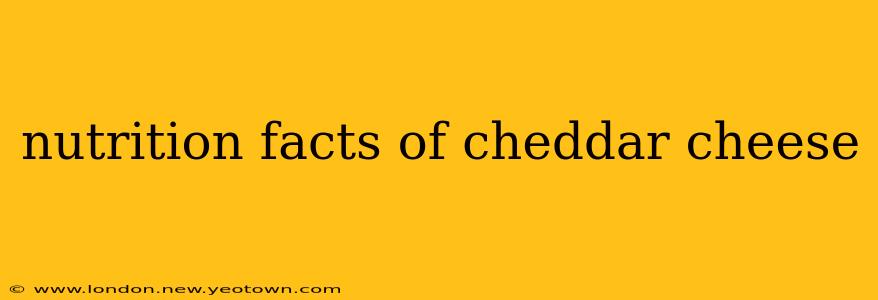Cheddar cheese, that sharp, satisfying staple of countless cuisines, holds more nutritional secrets than you might think. From its humble beginnings in Somerset, England, to its global popularity today, cheddar's journey is as rich and complex as its flavor profile. But beyond the taste, what exactly is packed into this iconic cheese? Let's embark on a journey to uncover the nutritional facts of cheddar cheese.
What are the nutritional benefits of cheddar cheese?
Cheddar cheese isn't just a delicious addition to your meals; it's also a surprisingly good source of several essential nutrients. A single serving, typically around one ounce (28 grams), offers a decent amount of protein, contributing to muscle building and repair. It's also a good source of calcium, crucial for strong bones and teeth, and phosphorus, another vital mineral involved in numerous bodily functions. Furthermore, cheddar cheese contains various vitamins, including vitamin A, important for vision and immune function, and vitamin K2, which plays a role in calcium metabolism and heart health.
How many calories are in cheddar cheese?
The calorie count in cheddar cheese can vary depending on the type and fat content. Generally, a one-ounce serving of cheddar cheese contains approximately 115 calories. However, sharper, aged cheddars often have slightly fewer calories than milder varieties due to moisture loss during the aging process. Always check the nutrition label of your specific brand for the most accurate calorie information. Remember, moderation is key to enjoying cheddar's benefits without exceeding your daily caloric needs.
Is cheddar cheese high in fat?
Yes, cheddar cheese is relatively high in fat, primarily saturated fat. A one-ounce serving typically contains around 9 grams of fat, with about 6 grams being saturated. While saturated fat has received negative attention in the past, current dietary guidelines emphasize a balanced approach, incorporating it in moderation as part of a healthy eating pattern. The type of fat in cheddar cheese also includes monounsaturated and polyunsaturated fats, which are considered healthier fats.
How much protein is in cheddar cheese?
Protein is a significant component of cheddar cheese. A one-ounce serving delivers approximately 7 grams of protein, contributing to your daily protein intake. This makes cheddar cheese a handy addition to snacks or meals, especially for individuals looking to increase their protein consumption for muscle growth or maintenance.
What are the different types of cheddar cheese and how do their nutritional values differ?
The nutritional values of cheddar cheese can vary depending on the type and aging process. Milder cheddars tend to have a slightly higher moisture content, potentially resulting in a slightly lower protein content compared to sharper, aged cheddars. The aging process also affects the fat content; sharper cheddars, having lost more moisture, might have a slightly higher fat concentration per ounce. However, these differences are generally minor, and the overall nutritional profile remains relatively consistent across various cheddar types.
Is cheddar cheese good for weight loss?
Due to its relatively high calorie and fat content, cheddar cheese isn't typically considered a weight-loss superfood. However, incorporating a small serving as part of a balanced diet can be perfectly acceptable. Its protein content can contribute to satiety, helping you feel fuller for longer, potentially reducing overall caloric intake throughout the day. Remember to monitor your portion sizes to manage your calorie intake effectively.
In conclusion, cheddar cheese offers a delectable blend of flavor and nutrition. While it's higher in fat and calories, its protein, calcium, and vitamin content shouldn't be overlooked. As with all foods, moderation and mindful consumption are key to reaping its benefits as part of a well-rounded diet. Remember always to check the nutrition label on your specific brand of cheddar for precise nutritional information.

